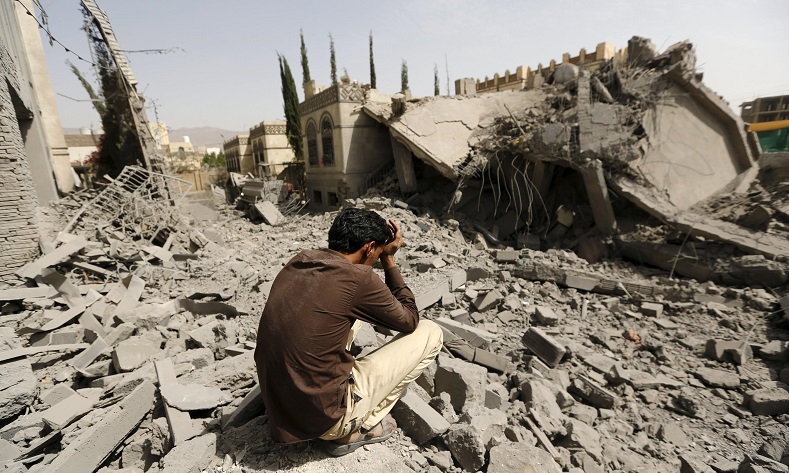 By Lawrence Reichard, January 14, 2018
By Lawrence Reichard, January 14, 2018
From Bricks and Mortars, Belfast (Maine) Republican Journal
The Kingdom of Saudi Arabia is systematically destroying the country and people of Yemen, an ancient civilization dating back 5,000 years. In its heyday, Yemen was a key crossroads of the Arabian peninsula, the Middle East and East Africa, and it was a welcoming, hospitable home to a wide variety of peoples, including Jews.
But Yemen has fallen on hard times. It is now the Arab World’s poorest country, and it is being destroyed by neighboring Saudi Arabia, with key, crucial support from the U.S.
Saudi Arabia has the fourth-biggest military budget in the world and $15.8 trillion in oil reserves, and with the assistance of the richest, most powerful country in the world, the Saudis are destroying a country with a per capita income of $2,500 a year. Like shooting fish in a barrel.
The figures are not pleasant. More than two million Yemeni children are suffering from malnutrition. UNICEF is able to help only about a tenth of them, and the Trump administration wants to cut U.S. support for UNICEF by half. The current fate of Yemeni children is reminiscent of the U.S.-led economic embargo of Iraq, which killed an estimated 500,000 children from 1990 to 2003.
More than a thousand children die every week from preventable diseases, and Yemen’s health care system has been almost completely destroyed by Saudi aerial bombing. The Geneva Conventions prohibit the targeting of civilian infrastructure, but that hasn’t stopped the Saudis from destroying almost all of Yemen’s water and sewage systems, leading to a cholera outbreak that has infected more than 600,000 Yemenis – with 5,000 new cases every day. It’s the worst cholera outbreak anywhere in the world since World War II. And ten thousand Yemeni civilians have been directly killed, and 40,000 wounded, by the two-year war.
In the U.S., that would be like 7.2 million people infected with cholera, with 60,000 new cases every day, and 12,000 children dying every week. And it would be like 120,000 directly killed by the war, with 500,000 wounded.
Two thirds of Yemen’s population is dependent on humanitarian aid, and in another Geneva Conventions violation, Saudi Arabia has closed all land, sea and air access to the country. If this blockade stands, it will be a veritable death sentence for Yemen’s 28 million people.
U.S. support for this disaster has been a bipartisan affair – just like Vietnam, Iraq and Afghanistan. In his eight years in office, President Obama sold $115 billion in arms to Saudi Arabia, a state that subjects large numbers of foreign workers to slave-like conditions, invades neighbors to crush pro-democracy movements, and publicly beheads citizens en masse for, among other things, apostasy, atheism, blasphemy, adultery, homosexuality and “sexual misconduct.” And Obama visited this human rights black hole four times.
But so far President Trump has been even kinder to the Saudis than Obama was. Only four months into office, Trump made his first pilgrimage to Saudi Arabia and signed a deal to sell $350 billion in arms to the Saudis. It was, and remains, the biggest arms deal in U.S. history and one that sent stocks of U.S. arms manufacturers soaring to all-time highs.
Human rights activists were hoping Trump, in his visit to Riyadh, might raise at least some level of concern about the ongoing humanitarian catastrophe in Yemen, but to no one’s surprise he didn’t.
But Trump has weighed in on the Yemen war and the U.S. role in it. In an article entitled “Trump’s Yemen Babble,” The American Conservative quoted then candidate Trump as saying this:
“Now they’re going into Yemen, and if you look at Yemen, take a look…they’re going to get Syria, they’re going to get Yemen, unless…trust me, a lot of good things are going to happen if I get in, but let’s just sort of leave it the way it is. They get Syria, they get Yemen. Now they didn’t want Yemen, but you ever see the border between Yemen and Saudi Arabia? They want Saudi Arabia. So what are they going to have? They’re gonna have Iraq, they’re gonna have Iran, they’re gonna have Iraq, they’re gonna have Yemen, they’re gonna have Syria, they’re gonna have everything!”
That’s reassuring.
The U.S. is doing more than just arm Saudi Arabia to the teeth. We are providing crucial midair refueling for Saudi bombers. According to Pacifica Radio’s Democracy Now, Saudi bombers would be unable to wreak their aerial destruction upon the people of Yemen without this aerial refueling assistance. We are also sharing intelligence and providing cluster bombs to the Saudis.
More than 100 countries have ratified a convention banning cluster bombs, which are particularly devastating to civilian populations. The U.S. is not one of those signatory countries. The State Department decries Syrian government use of barrel bombs in the Syrian civil war, but it is silent on Saudi use of cluster bombs in Yemen.
But there is some hope. A House Concurrent Resolution (H. Con. Res. 81) demands an end to U.S. complicity in the Yemen War, based on the War Powers Act, passed by congress in 1973 to stop the Vietnam War. The resolution is slowly attracting bipartisan support, but according to The Intercept, House Democratic Whip Steny Hoyer of Maryland is urging Democrats to not co-sponsor the bill. As stated, the Yemen war is a bipartisan enterprise.
Despite Hoyer’s effort to keep the Yemen war going, the resolution has 46 co-sponsors, 43 of them Democrats. Unfortunately neither first district Congresswoman Chellie Pingree nor second district Congressman Bruce Poliquin is a co-sponsor.
It’s highly unlikely Bruce Poliquin will ever co-sponsor a bill to draw down support for a country slated to buy $350 billion of arms from his pals on Wall Street, but perhaps Chellie Pingree could be convinced to take this modest step to stop the destruction of Yemen. Her Washington phone number is: (202) 225-6116.








